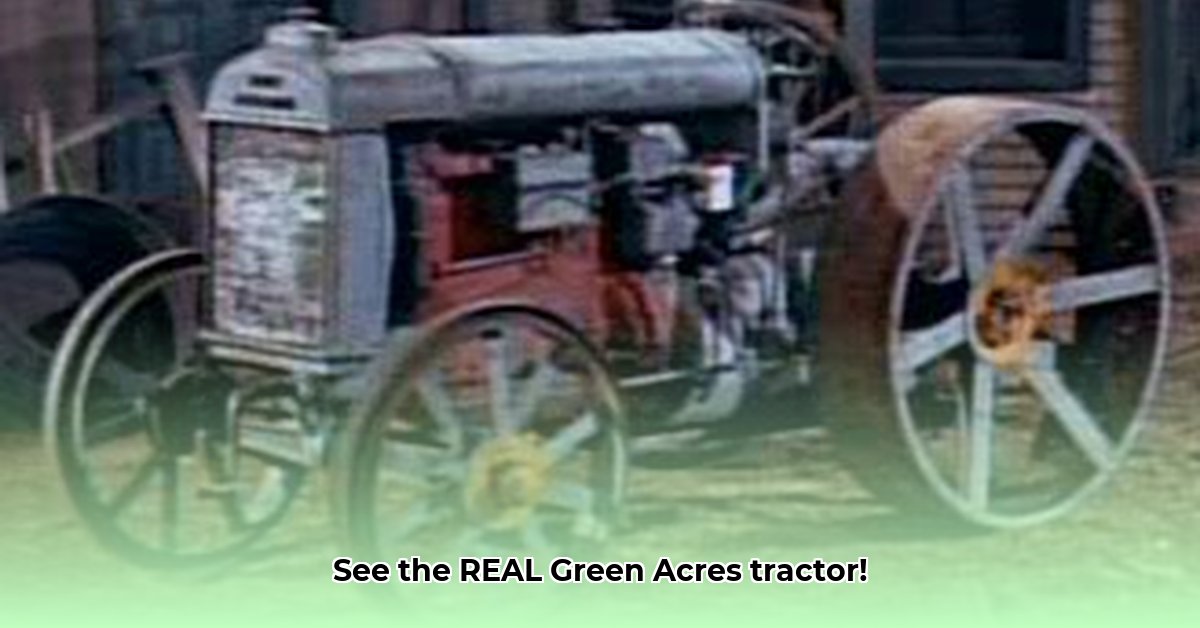
The iconic Hoyt-Clagwell tractor from Green Acres is a source of endless amusement, its breakdowns a comedic staple of the show. But this seemingly unique piece of farm equipment held a secret: it wasn't a real brand at all. For more tractor humor, check out this classic tractor joke. This article delves into the fascinating story behind the Hoyt Clagwell, exploring the real tractors used, the production decisions that shaped its on-screen persona, and its enduring legacy in television history. We'll uncover why the show's creators chose specific vintage models, the budgetary and practical considerations involved, and how these choices inadvertently amplified the show's comedic genius.
The Great Hoyt Clagwell Mystery
The Hoyt Clagwell tractor is more than just a prop; it's a character. Its unpredictable nature and constant breakdowns are integral to the show's humor. But was there ever a real Hoyt-Clagwell tractor company? The answer is no. The "Hoyt Clagwell" was a clever fabrication, a fictional brand name masking the use of readily available, and often temperamental, vintage tractors.
Meet the Real Workhorses: John Deere GP and Fordson Model F
While the opening credits often showcase a gleaming John Deere GP, a visual marvel of its era, throughout the series viewers see a different regular: the Fordson Model F. These weren't simply different angles on the same machine; they were distinct tractors, each used for specific scenes, enhancing the overall mystique of the fictional Hoyt Clagwell. But why were two different tractors used? The answer lies in the practical realities of 1960s television production.
[Insert images of John Deere GP and Fordson Model F tractors here]
Behind the Scenes: Budgets, Availability, and Accidental Comedy
The selection of these tractors wasn't arbitrary. Budgetary constraints almost certainly played a major role. Securing, maintaining, and insuring a specific tractor for the entire series would have been costly. Using readily available and comparatively inexpensive vintage models like the Fordson Model F proved a far more practical solution. Furthermore, the inherent quirks of these older machines—the occasional sputtering engine, the unexpected stalls—became a source of unscripted, and incredibly effective, comedy.
Did you know? A significant portion of the show's humor stemmed directly from the inherent unreliability of these vintage tractors. This accidental discovery transformed a logistical challenge into a comedic goldmine.
The Hoyt Clagwell's Comedic Genius
The Hoyt Clagwell's unreliability wasn't just a running gag; it became a character trait. Its breakdowns and stubborn refusals to cooperate in crucial moments were a constant source of amusement, perfectly complementing the show's comedic situations and character development. These scenes of frustrated farmers wrestling with an uncooperative machine resonated with audiences and enhanced the show's portrayal of charmingly chaotic rural life.
Beyond the Barnyard: Agricultural Technology in Popular Culture
The enduring appeal of the Hoyt Clagwell extends beyond simple slapstick. It offers a fascinating glimpse into how agricultural technology was, and often is, portrayed in popular culture. The fictional tractor subtly highlights the romanticized and sometimes inaccurate vision of dependable farm equipment. Its very unreliability made it relatable to audiences, demonstrating that farming, even on television, wasn't always smooth sailing.
The Hoyt Clagwell's Lasting Legacy
The Hoyt Clagwell tractor stands as a testament to the ingenious blend of fictional storytelling and the practical realities of vintage farm machinery. Its enduring popularity showcases the creative use of readily available resources and the unexpected comedic gold that can be mined from embracing the limitations of older technologies. The show's success with the Hoyt Clagwell serves as a reminder that sometimes, the most memorable moments arise from happy accidents.
Three Pivotal Points:
- The Hoyt Clagwell was a fictional brand, masking the use of real, vintage tractors.
- Budget constraints and equipment availability influenced the choice of tractors.
- The tractors' unreliability became a key element of the show's humor and lasting appeal.